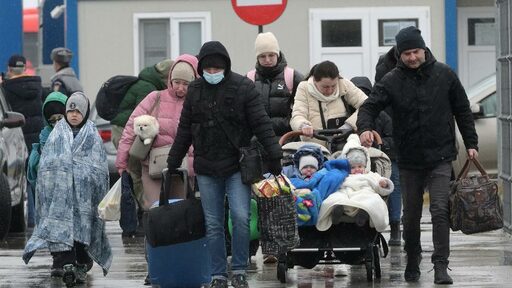On exploitation - Sara Cincurova and Steffen Lüdke in Der Spiegel:
‘Four million Ukrainians have asked for protection in the EU since the Russian invasion. And for the most part, the bloc has helped the refugees quickly and free of bureaucracy. The European Commission directive on providing help to refugees in the event of a mass influx has been activated for the first time, meaning that Ukrainians were not forced into protracted asylum proceedings, instead receiving permission to settle in the EU, receive financial assistance, seek work and attend integration courses. In Brussels, Berlin and Warsaw, leaders have patted themselves on the back for welcoming the Ukrainians with open arms. Commission President Ursula von der Leyen even issued a personal promise that the Ukrainians would be well taken care of.’
(…)
‘The Ukrainian woman who picked up Larionova and the other women from the train station declined to speak with DER SPIEGEL about the accusations that have been leveled against her. But she apparently made good money with Larionova and her daughter. A Slovakian official confirmed by phone that someone was receiving money that the Slovakian government had made available for private citizens who were housing Ukrainian refugees. The address to which that money was sent suggests that either Diana herself or someone in her orbit was the recipient. That support amounted to a bit more that 10 euros per day for Larionova and her daughter – more than she would have received per day from her job, according to the contract.’
(…)
‘The Russian invasion has eliminated around a third of all jobs in Ukraine. According to an Austrian study, almost 90 percent of Ukrainian women who fled the country hoped to be able to work in the EU. In social networks like Facebook, Viber and Telegram, there are thousands of job offers specifically targeting Ukrainians, carrying titles like "Work in Europe," or "Jobs for Ukrainians." The ads are frequently for au pairs, seasonal harvesters or cleaners. Some of them specifically request women. And in many cases, the Ukrainians have to pay a fee if they want the job.’
(…)
‘Between 2002 and 2021, the International Organization for Migration identified 18,480 Ukrainian victims of human trafficking, with a third of them identified as victims of sexual exploitation and the rest forced to work. Since the Russian invasion began in late February, the danger of exploitation has risen sharply. It used to be primarily men looking for work, but now the majority are women, frequently with children, and most of them lack any savings. Aid organizations, European interior ministers and the European Commission are all alarmed. They have distributed flyers, made sure that police are aware of the situation and set up hotlines. Just recently, Europol investigators managed to identify nine suspected human traffickers who were targeting Ukrainian women.
Still, officials don’t have as much of an overview as they’d like, particularly since the Ukrainians aren’t processed upon arrival. In contrast to refugees coming in from the Middle East or Africa, Ukrainians aren’t brought to shelters or camps upon arrival. Rather, they are allowed to enter the European Union without a visa and can then decide for themselves in which country they would like to settle. They are encouraged to find lodging with private families so as not to overwhelm the reception centers.’
(…)
‘The videos and photos that Karina and Nastia took, however, seem to tell a different story. They show the women scrubbing filth from the showers, assembling a chair and painting the walls of a room.
Karina and Nastia ultimately didn't last even three weeks at the hotel in Bad Pyrmont. One night, they say, they packed up their passports and took off. The Red Cross then helped them with their official registrations. Now, they are living in a different town in central Germany and learning German. The authorities are paying for an apartment for them in the home of a married German couple. They are finally staying with someone who has their best interests at heart.’
Read the article here.
Yesterday the State Secretary for Justice and Security in the Netherlands (Eric van der Burg) told me that a life in periphery of Dutch society (i.e. living without papers) was sometimes better than a live with papers in the home country of the refugee. Which is undoubtedly true.
But the risk of exploitation is serious, women are more vulnerable to exploitation and human trafficking (sex work) and since most Ukrainian refugees are women and children and the elderly it was only a matter of time before these stories would appear.
In June I heard in Tblisi from a woman working for UNHCR that in the UK, where the task of giving shelter to Ukrainian refugees basically was left to citizens many refugees had reported abuse and harassment.
A man had offered shelter to a Ukrainian woman, but she had to sleep in his bed. Just one example.
In one or two years commissions will research how this could have happened.
